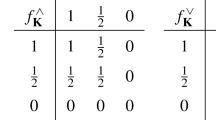Abstract
Inverse entailment (IE) is known as a technique for finding inductive hypotheses in Horn theories. When a background theory is nonmonotonic, however, IE is not applicable in its present form. The purpose of this paper is extending the IE technique to nonmonotonic inductive logic programming (ILP). To this end, we first establish a new entailment theorem in normal logic programs, then introduce the notion of contrapositive programs. Finally, a theory of IE in nonmonotonic ILP is constructed.
Access this chapter
Tax calculation will be finalised at checkout
Purchases are for personal use only
Preview
Unable to display preview. Download preview PDF.
Similar content being viewed by others
References
M. Bain and S. Muggleton. Non-monotonic learning. In: S. Muggleton (ed.) Inductive Logic Programming, Academic Press, pp. 145–161, 1992.
C. Baral and M. Gelfond. Logic programming and knowledge representation. Journal of Logic Programming 19/20:73–148, 1994.
F. Bergadano, D. Gunetti, M. Nicosia, and G. Ruffo. Learning logic programs with negation as failure. In: L. De Raedt (ed.) Advances in Inductive Logic Programming, IOS Press, pp. 107–123, 1996.
Y. Dimopoulos and A. Kakas. Learning nonmonotonic logic programs: learning exceptions. In: Proceedings of the 8th European Conference on Machine Learning, Lecture Notes in Artificial Intelligence 912, Springer-Verlag, pp. 122–137, 1995.
L. Fogel and G. Zaverucha. Normal programs and multiple predicate learning. In: Proceedings of the 8th International Workshop on Inductive Logic Programming, Lecture Notes in Artificial Intelligence 1446, Springer-Verlag, pp. 175–184, 1998.
M. Gelfond and V. Lifschitz. The stable model semantics for logic programming. In: Proceedings of the 5th International Conference and Symposium on Logic Programming, MIT Press, pp. 1070–1080, 1988.
K. Inoue and Y. Kudoh. Learning extended logic programs. In: Proceedings of the 15th International Joint Conference on Artificial Intelligence, Morgan Kaufmann, pp. 176–181, 1997.
V. Lifschitz, L. R. Tang, and H. Turner. Nested expression in logic programs. Annals of Mathematics and Artificial Intelligence 25:369–389, 1999.
J. W. Lloyd. Foundations of logic programming (2nd edition). Springer-Verlag, 1987.
L. Martin and C. Vrain. A three-valued framework for the induction of general logic programs. In: L. De Raedt (ed.) Advances in Inductive Logic Programming, IOS Press, pp. 219–235, 1996.
S. Muggleton. Inverse entailment and Progol. New Generation Computing 13:245–86, 1995.
S. Muggleton. Completing inverse entailment. In: Proceedings of the 8th International Workshop on Inductive Logic Programming, Lecture Notes in Artificial Intelligence 1446, Springer-Verlag, pp. 245–249, 1998.
C. Sakama. Some properties of inverse resolution in normal logic programs. In: Proceedings of the 9th International Workshop on Inductive Logic Programming, Lecture Notes in Artificial Intelligence 1634, Springer-Verlag, pp. 279–290, 1999.
Y. Shoham. Nonmonotonic logics: meaning and utility. In: Proceedings of the 10th International Joint Conference on Artificial Intelligence, Morgan Kaufmann, pp. 388–393, 1987.
A. Yamamoto. Which hypotheses can be found with inverse entailment?In: Proceedings of the 7th International Workshop on Inductive Logic Programming, Lecture Notes in Artificial Intelligence 1297, Springer-Verlag, pp. 296–308, 1997.
Author information
Authors and Affiliations
Editor information
Editors and Affiliations
Rights and permissions
Copyright information
© 2000 Springer-Verlag Berlin Heidelberg
About this paper
Cite this paper
Sakama, C. (2000). Inverse Entailment in Nonmonotonic Logic Programs. In: Cussens, J., Frisch, A. (eds) Inductive Logic Programming. ILP 2000. Lecture Notes in Computer Science(), vol 1866. Springer, Berlin, Heidelberg. https://doi.org/10.1007/3-540-44960-4_13
Download citation
DOI: https://doi.org/10.1007/3-540-44960-4_13
Published:
Publisher Name: Springer, Berlin, Heidelberg
Print ISBN: 978-3-540-67795-6
Online ISBN: 978-3-540-44960-7
eBook Packages: Springer Book Archive




